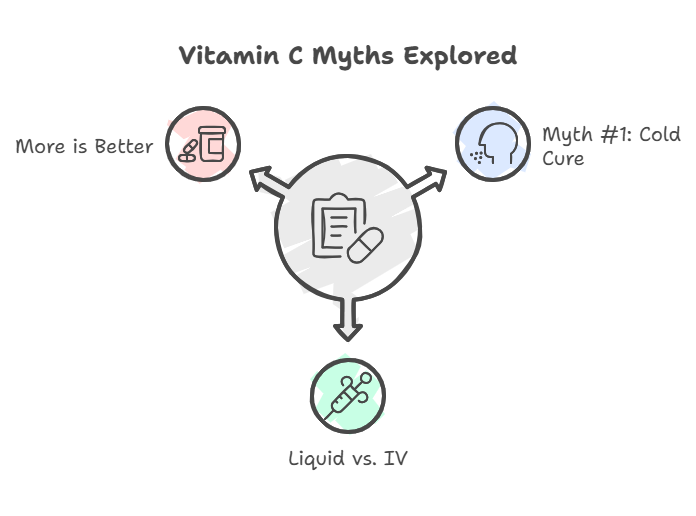Have you ever wondered about those vibrant elixirs promising a surge of well-being? Maybe you are a little embarrassed to not already know? You may be curious about how they stack up against traditional pills; we are talking about liquid vitamin C, of course.
“Higher absorption rates of liquid vitamin C can make it a preferred choice for individuals looking to maximize immune support and antioxidant benefits.”
Dr. Mark Moyad
Is it just another wellness trend, or could there be more to this story? This guide uncovers the potential benefits and what to consider before you make a choice.
What Is Liquid Vitamin C?
Vitamin C, a well-known antioxidant, is found in various forms. Liquid vitamin C is simply vitamin C in a liquid form. This includes liposomal and other delivery methods.
Types of Liquid Vitamin C
Various liquid forms exist. These each offer different ways for your body to use this essential nutrient.
- Liposomal Vitamin C: This form encapsulates the vitamin within liposomes. These are fat-like bubbles which helps it to absorb more readily.
- Standard Liquid Vitamin C: Often a water-based solution of ascorbic acid. Ascorbic acid is easily mixed into beverages or taken directly.
The liquid form of vitamins can be appealing for several reasons. Some people have difficulty swallowing pills or dislike chewable vitamins, making liquid options a convenient alternative. If you’re considering liquid vitamin D3, this guide provides more details on its benefits and usage.
Benefits of Liquid Vitamin C
Why choose liquid? Some research suggests that liquid supplements bypass some of the digestive processes required for pills. Here are some reasons to take a liquid vitamin1:
- Easy to Consume: Ideal for those who struggle with swallowing pills, such as children or the elderly.
- Potentially Faster Absorption: Some believe liquids absorb faster. This leads to quicker effects.
Vitamin C, also called vitamin c2, is critical for many processes in the body. It may come with additional health boons.
Potential Health Benefits
Vitamin C, in general, boasts several possible benefits. Understanding these can help you determine if it’s the right supplement for you.
- Immune Support: Vitamin C is known for its role in immune function. It may help boost the production of white blood cells which fight off infections.
- Antioxidant Protection: Vitamin C is a powerful antioxidant. Antioxidants can neutralize harmful free radicals.
- Skin Health: It’s needed for collagen synthesis, a protein that gives skin its elasticity.
There is reason to consider topical vitamin c3 too. This is for anyone who is interested in supporting healthy-looking skin.
Dosage and Usage of Liquid Vitamin C
Getting the dose right matters. Too little, and you may miss the benefits. Too much, and you might experience side effects.
Recommended Dosage
Dosage varies based on age, health, and specific needs. It’s best to talk with a healthcare expert. This ensures you’re taking the correct amount4.
They can provide tailored recommendations based on your individual health profile. Always read product labels for specific directions.
You need to also factor in upper limits of dosage for your age group.
How to Take Liquid Vitamin C
Liquids are flexible. They can be taken directly, or mixed. But its not just dosages that matter.
It is just as crucial to maintain your privacy5 when taking them, so check the supplement brand’s Privacy Notice.
Consider these factors for incorporating it properly:
- Mixing: Combine with water, juice, or smoothies. Be sure to fully incorporate into a drink of your choice.
- Timing: Some suggest taking it on an empty stomach for better absorption. Some people prefer to take with a meal. If you have a sensitive stomach, its recommended that you don’t take it on an empty stomach.
Factors to Consider When Choosing a Liquid Vitamin C Supplement
Not all supplements are created equal. Keep these factors in mind.
- Quality and Purity: Choose brands that have third-party testing. Third party testing ensures you get a safe product.
- Ingredients: Watch out for added sugars, artificial flavors, and unnecessary additives.
- Bioavailability: Consider liposomal forms. They have enhanced absorption.
The ingredients are an area of concern and some brands may include ingredients from companies with questionable privacy choices.
Reading Labels and Understanding Ingredients
Take the time to look over the supplement facts. This helps to inform yourself.
- Ascorbic Acid: This is the common form of Vitamin C.
- Sodium Ascorbate: This is a buffered, less acidic form, which is easier on sensitive stomachs.
Also be aware of potential allergens. For some, these may include corn, soy, or gluten.
Potential Side Effects and Interactions
Although vitamin C is generally safe, high doses may cause side effects. This is because it is a water-soluble vitamin that gets passed into your urine.
- Digestive Issues: High doses can lead to nausea, diarrhea, or stomach cramps.
- Kidney Stones: In rare cases, very high doses may increase the risk of kidney stones.
It’s wise to start with a lower dose. Then you can slowly increase it as tolerated.
Interactions with Medications
Vitamin C can interact with certain drugs. Talk to a healthcare expert if you’re taking medications. Especially talk to them before starting a supplement routine.
- Chemotherapy: Vitamin C can interfere with certain chemotherapy drugs. This may reduce their effectiveness.
- Anticoagulants: High doses may affect blood clotting. Use caution if taking blood thinners.
The Science Behind Vitamin C Absorption
How well your body absorbs vitamin C depends on a number of things. The type of vitamin C is one factor. Individual differences are another. The role of other ingredients play a big part too.
- Liposomal Encapsulation: Liposomes may fuse with cell membranes. This delivers vitamin C directly into the cell.
- Ascorbic Acid Absorption: This occurs in the small intestine. It’s limited by transporters. Higher doses have lower absorption rates.
Some companies that offer gold multivitamin and gold multivitamin liquid often incorporate ingredients which assist in absorption. It depends greatly from brand to brand though. Many will also formulate products for men’s health and children’s health to optimize vitamin absorption at different ages.
Interestingly enough, some brands such as Nature’s Plus even allow you to learn more about their privacy policy around health data.
DIY Liquid Vitamin C: Is It Possible?
Making your own supplements at home is a tempting idea for some. Here is some food for thought:
- Purity and Dosage: Homemade versions can’t proper dosing. It makes it hard to confirm purity too.
- Shelf Life: Homemade preparations may not last long. It might expose it to quick degradation.
Maximizing the Benefits of Liquid Vitamin C
Pairing with key ingredients helps in absorbing the nutrients for your immune system. Following general guidelines of your physician the absorption and efficacy.
- Pair with Bioflavonoids: These may boost vitamin C absorption and its antioxidant effects.
- Hydration: Take with plenty of water to aid absorption and reduce potential kidney issues.
Consistency is crucial, especially if you are seeking extended release benefits with liquid vitamin C. Maintaining healthy habits with liquid vitamin C consumption assists greatly.
Debunking Common Myths About Liquid Vitamin C
There are misconceptions with pretty much every single thing in the wellness industry. Its always important to research on your own.

A quick search will uncover there are some “facts” that are repeated, although questionable in validity. Its better to do more digging before committing to something.
- Myth #1: Its proven it cures the common cold. Unfortunately, it does not magically make that happen. Evidence shows that its helpful for immune support overall though.
- Myth #2: Liquid version is better than IV infusions. The potency between each varies greatly. They may assist, but is unlikely to match results that IV infusion gives, because liquid does not give the same boost of high dosage like that IV infusion does.
- Myth #3: More equals better. You will likely face adverse effects or even waste money if you are simply going to be passing that unused vitamin C into your urine.
Frequently Asked Questions
Is vitamin C in liquid form better?
Some think so. Liquid vitamin C may offer faster absorption compared to pills. Liposomal forms could have enhanced bioavailability.
What’s the best vitamin C liquid?
The best option depends on your needs. Consider quality, purity, and added ingredients. Liposomal options are good for absorption. Standard liquid forms work for simple use.
Which form of vitamin C is best absorbed?
Liposomal vitamin C may be the best absorbed. Its liposomes protect and deliver vitamin C directly to cells.
What happens to your body when you start taking vitamin C?
Vitamin C helps many processes. This may include enhanced immune function and improved skin health.
Some even claim that incorporating collagen peptides or peptides packets with your dosage help with its absorption and effect. However, consult with your doctor or healthcare professional first before trying any approach.
Conclusion
Making smart supplement decisions requires information. Exploring liquid vitamin C unveils choices around types, benefits, and proper use. Before including liquid vitamin C, talk to a healthcare provider. They can give tailored advice. This will help you on your wellness journey.
Many individuals also consider incorporating a children’s chewables multivitamin from the Animal Parade® line, such as the Animal Parade® Gold Multivitamin Children’s Chewables, to complement their vitamin C intake.
These multivitamins offer a comprehensive blend of essential nutrients designed to support overall health, especially for children who may benefit from additional nutritional support.
Furthermore, those focused on their immune support can explore products like Nature’s Plus Pro, known for its specialized formulations. It’s essential to choose products that align with your health goals, considering factors such as ease of consumption and the inclusion of additional ingredients like probiotics.
Probiotics are great for gut health. A balanced approach to supplementation, including liquid vitamin C and other beneficial products, can contribute to a well-rounded wellness strategy.
Small Step, Big Impact
To incorporate liquid vitamin C into your routine, consult with a healthcare provider to determine the appropriate dosage and ensure it aligns with your health needs.
Listen to this article
This is an AI generated Podcast version of the article.
- https://www.webmd.com/healthy-aging/what-to-know-about-liquid-vitamins-after-60[↩]
- https://novoslabs.com/novos-anti-aging-longevity-supplement/vitamin-c-anti-aging-supplement-longevity[↩]
- https://truffoire.com/what-does-vitamin-c-cleanser-do[↩]
- https://ods.od.nih.gov/factsheets/VitaminC-HealthProfessional/[↩]
- https://www.wholefoodsmarket.com/site-information/privacy-notice[↩]



